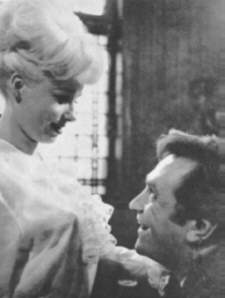
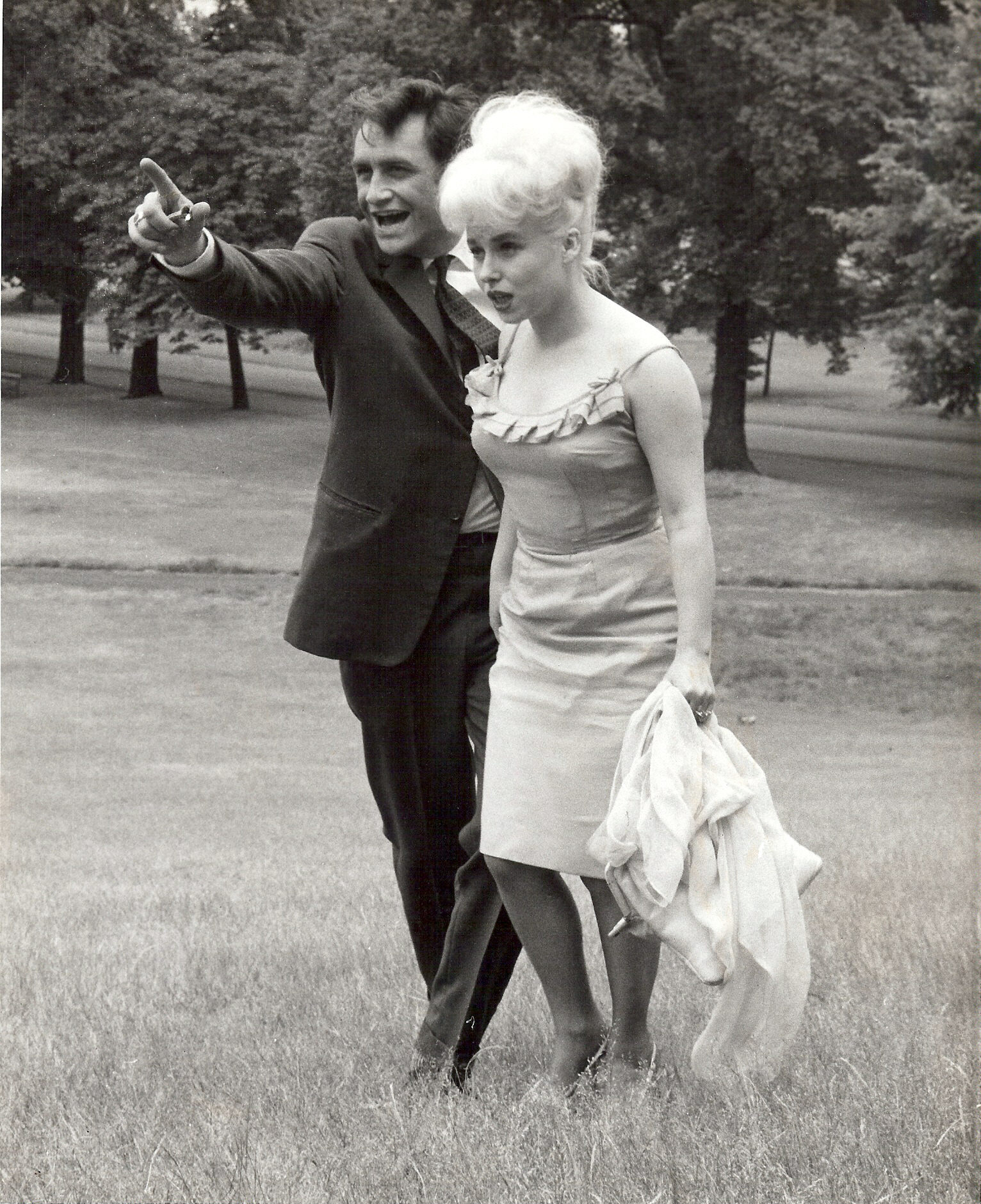


Sparrows Can't Sing (1963)
A Cockney sailor named Charlie Gooding (James Booth) comes home to London after a two-year voyage to find his home torn down and his wife vanished. He goes to stay at his mother's East End house while trying to find out what happened to his wife. Everybody who knows Charlie is sure he'll go ballistic when he finds out the truth, so nobody, not even his own family, will tell him that Maggie Gooding (Barbara Windsor) has shacked up with a bus driver named Bert (George Sewell). And she has a new baby of uncertain paternity. Charlie seems to justify their caution by bitterly recalling the last time he returned from a voyage only to find himself "father" of a bastard child old enough to speak.
Hoping to extort the true story from his family, Charlie takes his brother hostage in a pub. This ultimately causes Charlie's niece and her two suitors to go and fetch Maggie from the sterile high-rise where she now lives. On their way into the building, the trio encounters a minor functionary who harasses them with a thousand petty rules. But finally the niece manages to have a whispered conversation with Maggie out of Bert's hearing. Maggie puts the baby, Christabel, into a carriage and entrusts her to the niece. Then, running along in her high heels before an eager audience of local urchins, Maggie finally arrives at the pub.
After being tortured by her delay, Charlie feigns indifference on her arrival. But when Maggie insists she wants nothing more to do with him, Charlie sets out to re-seduce her, more or less from scratch. He buys her armloads of flowers and when she rejects them he picks out the prettiest one and says, "How about this one?" (She keeps it). Some game-playing and mixed messages ensue, which culminate in Maggie's flirting with Charlie while walking out on him.
Later, Charlie runs into Maggie as she's wheeling Christabel down the sidewalk in the pram. Maggie tries to run away from Charlie but he overtakes her and follows her down the street, asking a lot of questions about the baby. The more Maggie insists it's none of his business, the more convinced he becomes that the baby is his. "Look at that expression!" he cries. "That is definitely my daughter." (And the dark-haired infant really does look like him. She should: she is his real-life daughter, Sarah.) Charlie becomes so enchanted with the little girl that he takes over the pram. Wheeling it along and flirting with the baby, he begs Maggie to set up housekeeping with him right away. "Look, I'll make a home for you," he pleads eagerly. "Look, I'll buy you that bed.". Maggie lies her way out of any commitment but agrees to meet him later without the baby. "You know what you are, don't you?" Charlie says. "I think you're the darlin'est, cunningest little bird I ever came across." And he embraces her.
Charlie buys some bedroom furniture and a crib and trucks them to his mother's house. Then he scrubs a room from top to bottom and installs the furniture, in anticipation of his wife's ultimate return. He unwraps the present he brought for her--a simple, sheer nightgown--kisses it, and lays it out neatly on the bed.
Meanwhile, Maggie guiltily debates with herself whether to keep her appointment with Charlie. Eventually her reawakened desire for him outweighs her loyalty to Bert. Just as she's whirling gleefully around in front of a mirror, preparing to dress, Bert returns from work early. He's sick and expects Maggie to play nurse. Maggie gets away as quickly as she can and hitches a ride to meet Charlie at a park. After an initial tinge of jealousy, the scene becomes intensely lyrical and romantic. Charlie and Maggie walk up a grassy slope, go over a fence, and come to some stone steps up a hillside (where they stop to kiss). Eventually they find themselves at the top of the hill, on the edge of the woods that serves as the local lovers' lane. Charlie comments on the smell: "like wintergreen." "Don't try to persuade me because I haven't made up my mind," Maggie warns Charlie. He playfully pulls down one of the straps of her dress and says, "You know you can't resist me." "Anyone would think we weren't married, the way we carry on," Maggie giggles. They wander off into the woods. Fade out! When they re-emerge, Maggie says, "I didn't think that would happen," and Charlie replies, "Yes you did." He invites her to spend the night with him. When she says, "No, I can't leave them" referring to her babies, he replies, "Well you ain't leavin' me." He hails a cab and drags her off to a pub "to celebrate."
Bert shows up at the same pub and bitterly concedes that Maggie now prefers Charlie. A slapstick brawl erupts in the bar. Outside, Charlie and Maggie engage in their own stylized tussle: Charlie spanks Maggie, who pummels Charlie fearlessly despite the size difference. The film closes with a view of the couple's darkened bedroom, where Charlie assures Maggie that no matter how many times he leaves he will always come back to claim his "conjoogal rights."
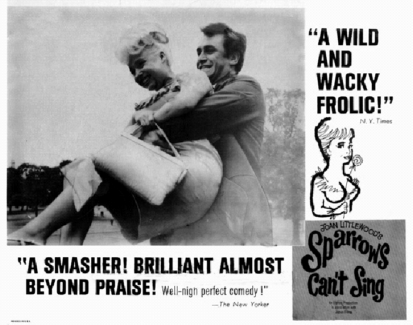
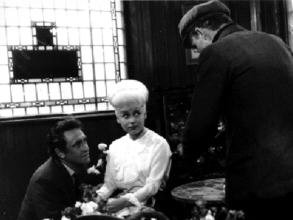
* * * * *
Sparrows created a stir. Its debut at the ABC Cinema in Stepney attracted a large audience of the rich and famous, including the notorious East End mobsters the Krays, who had a walk-on part near the end of the film . The New Yorker called Sparrows a "well-neigh perfect comedy." Barbara Windsor in particular got a lot of attention afterwards. She was feted in New York, appeared on The Tonight Show, and eventually won the 1963 British Film Academy Award for Best Actress for her performance as Maggie.
There was some pother about releasing Sparrows with subtitles for distribution in the US because it was feared that American audiences might not understand the improvised dialogue, which is full of Cockney accents and slang. The dialogue's hard to understand, all right, but not because of any language barrier. The real problem is poor sound recording. In fact, the technical qualities of Sparrows Can't Sing are so primitive and low-budgety overall that the film seems much older than it is, like a relic from the silent or early sound period--especially given the broad, stagey style of acting that predominates. (Kinnear's slapstick scene as a drunkard on a ladder could have come from Laurel and Hardy.) But that is part of the film's charm.
Director Joan Littlewood, who founded the London Theatre Workshop, obviously adores Cockney subculture and resents soulless modernism. She presents the East End slums as warm and earthy, teeming with children and abounding in cultural diversity. Maggie and Charlie are caricatures of working class hypersexuality and toughness, like Donald McGill cartoons. In romanticizing the English working class and satirizing planned utopias (viz., the "sterile highrise" sequence), Littlewood resembles nobody more than Orwell (who loved Donald McGill's work and probably would have loved Sparrows). Maggie's choices--Bert vs. Charlie--also represent two different types of social organization. The bus driver's building, with its vast, empty concrete plaza and resident martinet, discourages community. But the sailor's neighborhood is a sort of extended family where everybody knows everybody else's business and people take care of each other.
James Booth looks fantastic in this film--slim, powerful, bursting with life. He wears his hair slicked back into a ducktail with a sight quiff, while a suit and tie give him a kind of casual elegance. (On the down side, he also wears one of those Dick Van Dyke hats that were in fashion at the time. Oh, well.)
Sparrows Can't Sing was revived at the same theater where it premiered--Genesis Cinema (formerly known as the ABC Theatre)--on Thursday, December 6, 2001. It was also revived in the summer of 2002 at the Gene Siskel Film Center in Chicago.
Text copyright Diana Blackwell, 2002.
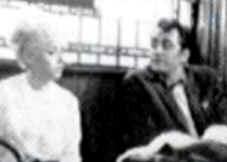
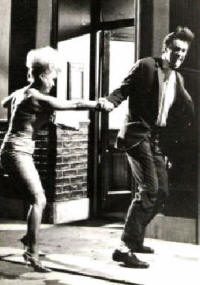
Appendices
Link: Sparrows Can't Sing available from BFI
ABC Film Annual 1964: "What do you Know?"
Link: Can you identify these locations from Sparrows Can't Sing?
Films and Filming, 3/63 (photo spread, short article)
Films and Filming, V. 9, N. 6, Mar. 63, 32-33 (Gow review)
Link: Sparrows Can't Sing described in film festival article
All of Me by Barbara Windsor
Joan's Book by Joan Littlewood
National Review, 15:72 JL 30'63
Nation, 196:430, MY 18 '63
New Republic, 148:30, MY 18, '63
New Yorker, 39:169-70, MY 18, '63
Saturday Review 46:40, MY 11, '63
Filmfacts V. VI (1963) p. 94
Movie, N. 7, p. 36
Sight & Sound, V. 32, N. 2 (Spring '63), 92-93
NY Times, My 12 II, 1:8
NY Times, My 31, 30:1